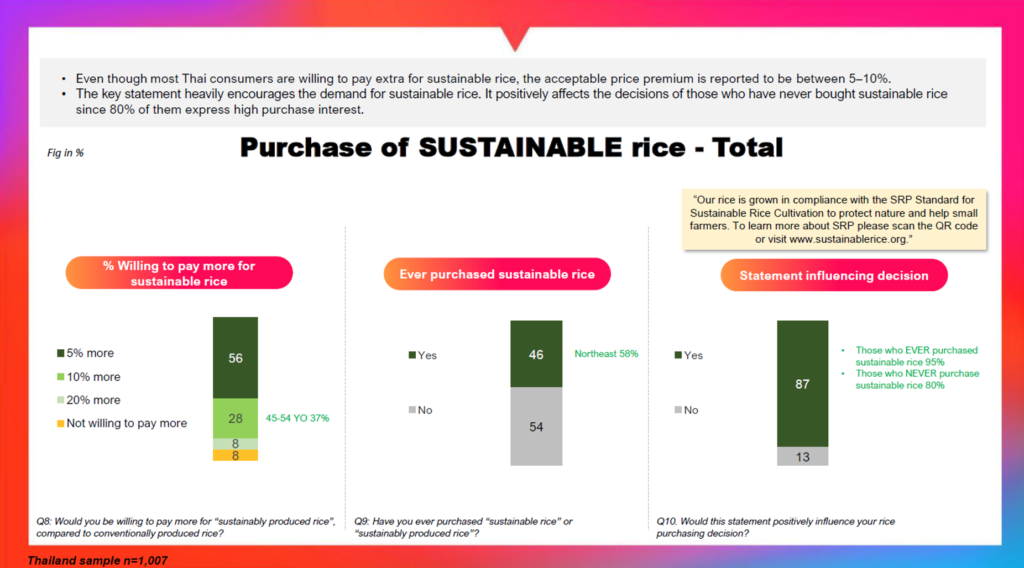Through cooperation projects with the Thai public sector and multinational private sector, GIZ works to increase awareness of the benefits of sustainable rice among producers, brands and retailers and consumers in key rice producing countries in Asia and Africa.
During March 2022, GIZ Thailand commissioned YouGov, a global market research and data analytics firm, to conduct a study of Thai consumers who regularly consume rice. The primary objectives were to understand Thai consumers’ perception towards sustainably produced rice, particularly the characteristics that consumers attribute to sustainable rice and whether the presence of these characteristics positively impacts purchasing decisions.
Here’s what we learned about Thai consumers – 100% of whom indicated they consume rice five or more times per week. The survey targeted decision-makers on food purchases within the household across regions, gender, age, education, occupation and income groups, and received over 1,000 responses.

Overall, drought and climate change (57% respectively) are seen as the top environmental and social challenges in agriculture and food production which require interventions to achieve greater sustainability, followed by concern regarding chemical contamination (44%) and farmer welfare and livelihoods (35%).

While quality (61%), price (47%), food safety (45%) and nutritional value (34%) were. as expected, top of mind for consumers when making purchasing decisions for agricultural food products, Thai consumers are considering and valuing a wider range of factors when it comes to buying agricultural food products that they perceive as more sustainable.

Nearly three-quarters of consumers (72%) claim to have previously purchased sustainable agriculture and food products, especially among younger and higher income groups. Of those who had made such purchases, the most influential drivers for their purchase were perceived as higher quality (81%), benefits to health (67%), better taste (58%), and positive environmental impact (47%).
Awareness and understanding of sustainable rice
A majority of Thai consumers (57%) have heard of “sustainably produced rice” or “sustainable rice”, with awareness especially high in the Northeast region (69%).
While there is no single accepted definition for sustainable rice, over half of Thai consumers associate sustainable rice with minimised use of chemical inputs (63%) and improved livelihood for farmers (50%), and over one-third associate it with being healthier (43%), protecting biodiversity (42%), and improving soil health (36%).

Almost half of Thai consumers (46%) indicated that they have purchased sustainable rice previously. Of this group, nearly all respondents (97%) expressed a willingness to pay a higher price for rice that has their priority sustainability attributes. The profile of this group of consumers is majority female (54%), spans age groups (18-54 years), and tends toward higher education (93%) and income (73% working full time).
Social media (64%), television (36%), and in-store/point-of-sale communication (31%) are the main sources of information for consumers’ priority sustainability attributes for rice. In line with media habits, younger consumers rely more on information from social media, while older consumers spend more time seeking information at point-of-sale. The most common places of purchase of rice were hypermarkets and local or fresh markets.

In Thailand, GIZ partners with the Rice Department and rice value chain companies to advance the production of sustainable rice in three provinces in the Northeast and six provinces in the Central Plains regions. Projects build capabilities of rice farmers to supply sustainable rice to the market, showcasing that producing rice sustainably is not only viable but helps farmers, communities, and businesses to thrive.
Ramping up communication and education to Thai consumers on the value of sustainable rice is equally critical to attract and grow interest in this all-important agriculture and food product. Showing how improved production methods tangibly address priority sustainability attributes and purchase drivers of consumers will help build domestic demand for sustainable rice.
Note: This study also included the surveying of consumers in Indonesia, Vietnam, India and Pakistan, using an identical methodology, with over 1,000 responses received per country. A similar initiative to raise awareness of consumers in Nigeria is also underway.
